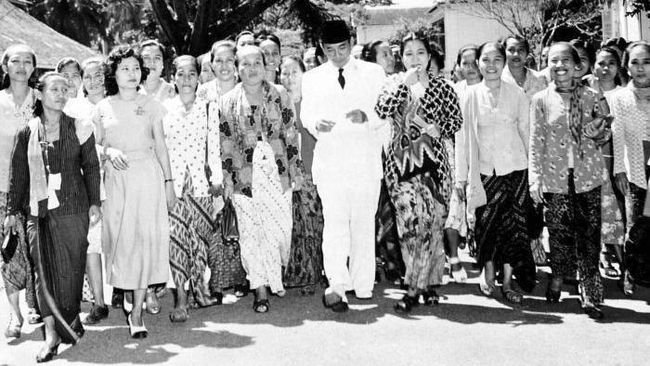Data Colonialism in Indonesia. Artist’s Strategies against Digital Colonialism
FWF | Elise Richter PEEK Fellow
Stefanie Wuschitz, Institute for Education in the Arts
Duration: 1.11.2023 – 31.10.2027
This arts-based research builds heavily upon "Coded Feminisms in Indonesia" (2021), an arts-based research project by Stefanie Wuschitz and Astrid Reza, which raised questions about a particular women’s movement that emerged in Indonesia in the 1960s and grew to become the largest feminist movement of its time. The Indonesian Women’s Movement had an international impact through its vibrant grass-roots activism, anti-authoritarian pedagogy and influential anti-imperialist and non-aligned position. The movement was criminalized during Indonesia’s New Order Regime, thereafter its legacy is only preserved in encoded form.
Applying feminist new materialist practices this project thinks data colonialism in Indonesia together with anti-colonial struggles of the 1960s. The term data colonialism stands for the appropriation of raw data, which counts as a top-ranking resource. Reclaiming a position within a disrupted history of ideas, young Indonesian media artists create relevant online counter publics. Do strategies developed to face previous forms of colonialism still resonate in their work? Is Indonesia’s anti-colonial legacy still relevant in Indonesia's media art scene? Its ambivalent influence on current digital art has been insufficiently investigated. My research aims to contribute to a diffractive reading of gendered forms of oppression, art and data colonialism; and to answer the research question whether data colonialism silences artists to the extent that centralized violence could silence artists in Indonesia up until the late 1990s. The fieldwork will be conducted in Yogyakarta, Java, supported by Universitas Sanata Dharma (USD) and Ruang Arsip dan Sejarah Perempuan Indonesia (RUAS), a Space of Women Archives and Herstory. The arts-based research project transforms (i.e. collects, translates and tags) in-depth interviews and analogue archive materials into animated stories that make sense of findings. Stories can form knowledge objects that deepen our understanding of complex matter. Processing fieldwork in Indonesia through animations, stories and visual art will foster transparency and, at the same time, help to protect the privacy of the citizens interviewed. Peer-reviewed paper publications, habilitation and a film will mark the final conclusion of the project.
Short biography
Stefanie Wuschitz (*1981) is a data-research based artist in Vienna. Her scholarship generates data that shapes her artistic output. She investigates the entanglement of gender, technology and power. Within the young, Eurocentric field of data studies, her current projects focus on a blind spot of South East Asia: Indonesia’s position within fast shifting techno empires. As principal investigator of Data Colonialism in Indonesia she collaborates with Indonesian artists, ecofeminists and scholars at Sanata Dharma University. Together they study how the legacy of anti-colonial mass movements of the 20th century resonate in today’s resistance against data colonialism. Here data is understood as a cultural commodity that needs to be socio-politically contextualised, protected and analysed. Alongside scholarly output the analysed data is also feeding into art projects such as interactive art installations, drawings and animations. Her degrowth inspired artistic method entails upcyling, salvaging sustainable, locally sourced materials to create ecofeminist interactive art installations. Her drawings and animations explore new forms of storytelling, knowledge transfer and documentary.
She graduated with honors in the MFA program Transmedia Arts in 2006 (Brigitte Kowanz) and completed her Master’s at NYU 2008 at Tisch School of the Arts in NYC. In 2009 she founded the hacklab and collective Mz* Baltazar’s Laboratory. She completed her Doctorate on Feminist Hackerspaces at TU Vienna in 2014. Since then she has held post-doctoral positions at the University of Applied Arts Vienna, TU Vienna, Universität der Künste Berlin, TU Berlin, and others. She conducted several arts-based research projects as PI (titled Feminist Hacking, Salon of Open Secrets, Coded Feminisms in Indonesia). Her artwork was featured in solo exhibitions, film festivals and international venues. Her co-authored book Hardware and Eco-feminist Art. Hacking and Artistic Practices Towards Ethical Technology will be published October 15th 2025. Teamed up with Patrícia J. Reis she was nominated for Ars Electronica S+T+ARTS prize, in collaboration with Klara Rabl she received the content award, with her collective Mz* Baltazar’s Laboratory she was awarded as Outstanding Artist, for her Doctor thesis she won the Johanna Dohnal Prize. She received Academic Excellence Scholarships by the University of Applied Arts Vienna, by New York University, Digital Arts Fellowship HUMlab in Umeå, Programm DiGiTal at TU Berlin and by the Elise-Richter-Program of FWF.
As an artist she was represented by Sixpackfilm and is up until now represented by Galerie 3. Stefanie Wuschitz had solo exhibitions at Kunstraum pro arte, Galerie 3 and with her collective Mz* Baltazar’s Laboratory at VBKÖ, Kunstraum pro arte and Medienwerkstatt in Austria among others. The project Clay PCB was exhibited at AMRO, the Ars Electronica Festival in Linz, Chaos Communication Conference in Hamburg and will be presented in India at Khoj in New Delhi 2026. The video Coffee Table was screened/installed at Aveiro Biennale in Portugal, xCoAx in Italy and Back to Athens Festival in Greece among others. The animation Coded Feminisms in Indonesia was presented at Arthall WEX, at Galerie 3 and at Kunstraum pro arte in Austria, at Sapienza University Rome, Italy, Africa-Asia 3 ConFest Dakar, Senegal, Sanata Dharma University Yogyakarta, Indonesia among others. Her project Looped Scroll was presented at Electric Avenue in Austria, Sinop Biennale in Turkey, Bouillants in France and ART|JOG 8 in Indonesia. She worked as lecturer at international universities since 2009 and was invited to give keynotes at several international conferences.
